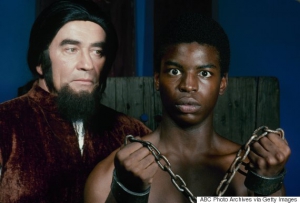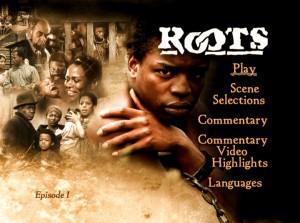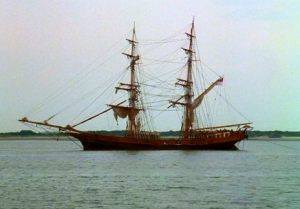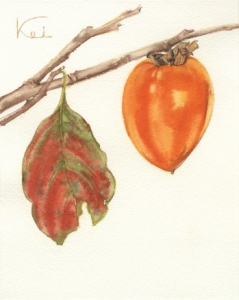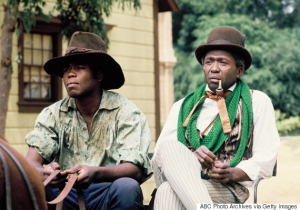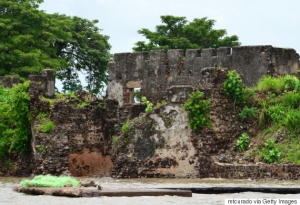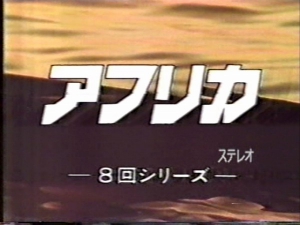5回目の授業でした。また前日になってしまいました、申しわけないです。
記憶も曖昧やったんで、ブログで投稿してくれた時に書いてくれたアドレスを使わせてもらって橋口くんに聞いたら「先週は、奴隷商と奴隷船長の会話を聞いて、TOEICpart3
映像は確か見てなかったです。」という返事をくれました。ありがと。
奴隷商と奴隷船長の会話の日本語訳、前回忘れてたのでを貼っておきます。1700年代やから古い英語やね。
次回は①TOEICpart3
「五つの銅貨」の中のBattle Hymn of the Republicを観て聴いてから、"Deep River," “Go Down, Moses," “Joshua Fit the Battle of Jerico”も聴けるとええね。
トーイックは出来たやろか。
あした、また。
<Reference 1> An excerpt from Roots <参考文献 1>「ルーツ」からの抜粋
We can find an example of the slave trade from the following scene of the American film Roots which hints to us what the slave trade was like.
アメリカ映画「ルーツ」の次の場面を見てみましょう。奴隷貿易がどんなものであったか、その一端を窺い知るが出来ます。
In this scene Captain Davies (D) of the slave ship talks with a slave trader John Carrington (C) in his cabin after his ship landed the North America:
この場面では、奴隷船が北アメリカに着いた後、デイヴィス(D)船長が船室で貿易商人のジョン・キャリントン(C)と次のような会話を交わしています。
C: Did you have a good voyage, Captain? カリントン(C)「船長、船旅はうまく行きましたかね?」
D: My first officer is dead, ten seamen and the ship’s boy, . . . more than one third of my crew. デイヴィス(D)「一等航海士と船員が十人、それにボーイが一人……、私の乗組員のうち三分の一以上が。」
C: Oh well, God rest their souls. But the life blood of commerce is goods, sir, goods. How fares your cargo through the passage, Captain? C「おう、それはお気の毒に、その人たちの魂に神の御加護がありますように。しかし、貿易の大元は何と言っても商品ですからね、商品ですよ。ところで船長、海の上では積み荷の加減はどうでしたかね?」
D: Three thousand elephant teeth have survived the voyage. D「船旅では三千本の象牙が何とか事なきを得ましたよ」
C: You’re a pretty wit, sir, a pretty wit . . . elephant teeth indeed . . . . C「船長、冗談がとてもお上手ですな、とてもお上手で……三千本の象牙とは……」
D: One hundred forty Negroes were loaded aboard the Lord Ligonier at the mouth of the Gambia River. D「ガンビア川の河口で、百四十人の奴隷をロード・リゴニア号に乗船させました」
C: Oh. A loose pack. Well . . . . C「それは、ゆったりとした積み方で。それで……」
D: Of those, ninety-eight were alive when we made port. D「そのうち、港に着いたときの生き残りは九十八人でした」
C: Ninety eight. Oh, less than a third dead. I have known slavers to make port with less half surviving and still show a handsome profit. My fericitations, Captain. C「九十八人。そうですか、それでは、死んだのは三分の一以下ですな。入港した時に、生き残りが半分以下でも、まだかなりの利益があった奴隷商を私は何人も知っておりますよ。おめでとうございます、船長」
D: How soon can I unload? D「一刻も早く積荷を下ろしたいのですがね」
C: Directly we warp your vessel to the wharf. C「直ちに船を曳いて行って、岸壁にお着けしましょう」
D: I want you to secure for me flowers of sulphur to burn in the hold. I wish to see my ship clean again. D「船倉で燃やす硫黄の粉をぜひご用意いただきたい。もう一度、きれいになった船が見たいのです」
C: Oh, naturally, sir. After all you’ll be carrying tobacco to London. C「それは、もう、船長。それから、船長はまた、ロンドンへ煙草を運んで行かれることになりますね」
D: And in London . . . . D「そして、ロンドンで……」
C: Trade goods for the Guinea Coast, and then on to the Gambia River. C「ギニア海岸向けの貿易の品を、それから、またガンビア川に向けて」
D: And more slaves . . . . D「そして、もっとたくさんの奴隷を……」
C: Indeed, sir. Thus does heaven smile upon us, point to point in a golden triangle. Tobacco, trade goods, slaves, tobacco, trade goods and so on ad infinitum. All profit, sir and none the loser for it. C「その通りですよ、船長。かくして天は我らにほほ笑みかけ、黄金の三角で点と点を結ぶ。煙草、貿易の品、奴隷、煙草、貿易の品など、永遠に限りなく。誰もが得をして、損するもの誰もなし、ですよ」
D: Tell me, Mr. Carrington, do you ever wonder . . . . キャリントンさん、あなたは疑ったことが・・・
C: On what topic, sir, to what end? 何のお話に関して、何のためにでしょうか?
D: As to whether or not we are just as much imprisoned as are those chained in the hold below? この船倉に繋がれている奴隷たちと同じようにわたしどもも縛られているのではないかどうか?についてですが。
C: I do not follow your meaning, sir. どうもおっしゃる意味を理解しかねますが。
D: It sometimes feels that we do harm to ourselves by taking part in this endeavor. この事業に関わることで自分たち自身を傷付けていると感じる時もございます。
C: Harm? What harm can there be in prosperity, sir? What harm is a full purse, I’d like to know. 傷付けるですと?こんなに栄えているのにどんな害が?儲かってどんな害があるのか知りたいものですなあ。
D: No, no, I doubt that you’d like to know, Mr. Carrington. I doubt that either of us would truly like to know. いや、いや、キャリントンさん、あなたもお知りになりたいのではないかと。私どもはどちらも知りたいのではないかと。
C: Would you be interested in coming to the auction, Captain? I warrant you’ve never seen anything like it. 船長、奴隷市に来られるお気持ちがおありですかね?そんな見物はご経験ないこと間違いなしでございますよ。
D: No, I am sure I have not, Mr. Carrington. I do know that I am not interested in seeing it now . . . or ever. ええ、キャリントンさん、経験ないと思いますよ。観たい気持ちが今もありませんし、これからも決して・・・・・
